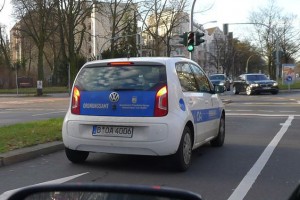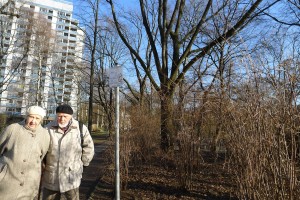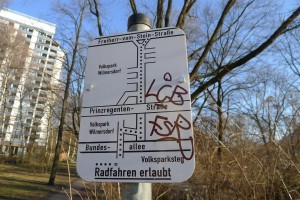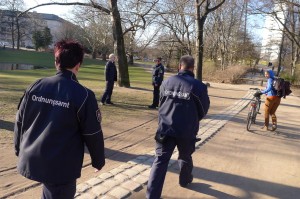Several months ago while driving in Berlin, I was passed by an official-looking car that caught my attention. I snapped this photo of it at the next intersection:
The word Ordnungsamt on the back of the car translates literally as Orderliness Department, although a more meaningful rendering might be Office for Public Order. I know that Germans have a reputation for being orderly, but still I was surprised to see that a public office was devoted to maintaining order. And I wasn’t really sure what members of the Ordnungsamt do. Today I found out.
It was a lovely early spring (or shall I say late winter, for those if you in New England) day. Sun shining, temperatures in the mid-forties. Annette and I decided to bike across town to Kreuzberg where she would do computer work in a cafe while I worked on my bike at the Regenbogenfabrik. We made our way leisurely eastward through the Volkspark, a long strip of green that snakes from Wilmersdorf to Schöneberg. The park was being well-used. We saw teachers corralling children in bright yellow safety vests, youngsters playing soccer, parents and their kids in the playgrounds, young lovers lounging under trees — all enjoying the delicious sunshine. Just before the pedestrian/biking bridge that spans a large street bisecting the park, we came across four officials dressed in navy blue. They were talking with a bicyclist who had dismounted, and before we knew it, two of the officials were upon us.
“You’re not allowed to bike through the park,” they told us.
Annette protested gently: “But everyone bikes through the park. We didn’t see any signs forbidding it.”
It turns out that there are small signs, which I had never before noticed, indicating where biking is allowed — but none forbidding biking on the path we were using. I saw the following sign as we were leaving the park. Had to study it to figure out exactly what was allowed:
The officials told us that the fine for biking through the park was twenty Euros, and asked us to pay up.
“What if we don’t have twenty Euros to pay you?” I asked, trying to sound curious rather than rude. I actually had twenty Euros, but handing it over to the officials on the spot seemed primitive to me. I also felt that they should have to work a bit harder for the fee, because we cyclists in the park were like sitting ducks.
They asked for our Personalausweise, personal identification. As I handed over my New Hampshire driver’s license, I had a flashback to downtown San Diego, summer of 1981. I’m a long-haired eighteen-year-old walking quickly to catch a bus back to the crowded harbor where I am living for the summer with my friend Chris on his wooden sailboat. I hear shouting behind me, and turn to see a couple of police officers gesticulating in the distance. I keep walking, confident that whatever they are doing doesn’t concern me. But the shouting gets louder, and eventually I realize that the police officers are targeting me. It takes me some time to realize why they have stopped me. When at first I say “I don’t understand,” they respond quickly with “What do you mean you don’t understand? Are you on drugs?” My appearance doesn’t help. My clothes are grubby and I smell, because I have just finished an eight hour shift filleting fish in a nearby warehouse.
When I realize that I have been stopped because I crossed the last intersection when the sign said Don’t Walk, I become impudent (did I mention that I was eighteen years old?): “Back where I’m from, it’s not a crime to cross the intersection when no cars are coming.”
“Well around here,” says one of the officers sharply, “we obey the law.”
That situation escalated to the point where I was threatened with jail.
The officials who stopped us today in the Volkspark were not surly. They were calm and patient. Orderly. And Annette and I were cooperative.
“How long are you here for?” they asked, after examining my driver’s license.
“About a year.”
“Are you registered residents of Berlin?”
“Yes, we are.” They asked for our address, and I handed them one of the Visitenkarte that we had had printed for just such occasions. Well, perhaps not for just this occasion.
While one of the officials made a phone call to confirm that we were in fact registered residents of Berlin, I asked the other official, hypothetically speaking, what would happen if we were not official residents.
“Then we couldn’t mail you a ticket. We’d have to contact the police, and they would escort you to an automated teller machine.”
Our residency confirmed, the officials bade us farewell — and reminded us to walk our bikes. As they were leaving, I saw that Ordnungsamt was printed on the backs of their jackets.





Reading this while on a visit to San Diego. I did comment last nite at dinner in Carlsbad, how neat, clean and orderly everything seemed in contrast to New England. We did actually cross the street several times without using designated cross walks…….without even thinking twice about it. Must be a deeply ingrained New England disregard for rules and regulations! Thanks for the post.
Hey Andrew. Thanks for the photos and updates. Hello to the Family! I hope you are all doing well in Berlin. Things are looking like Spring here on on the Pratt rd. It’s was a cold, long winter, so this is good. Enjoy the rest of the trip!
Peggy